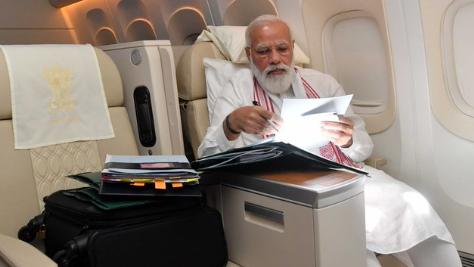

Prime Minister Narendra Modi's approach to international travel has become a talking point in diplomatic circles, not for its extravagance but for its stark austerity. Breaking from the traditional protocols of high-office travel, Modi has consistently chosen to avoid hotel stays during technical halts and instead opts for rest at airport terminals – a practice that has saved significant taxpayer money while setting a powerful example of fiscal prudence.
Breaking Traditional Protocols
During long-haul flights that require technical stops, most heads of state typically check into five-star hotels, even for brief layovers. These stays, while comfortable, come with substantial costs: not just in hotel bills, but in additional security arrangements, local transportation, and support staff accommodation.
Modi's departure from this norm began during his early days as Prime Minister in 2014 and has continued consistently through his terms. During technical halts in cities like Frankfurt, Helsinki, and Abu Dhabi, the Prime Minister has regularly chosen to rest and refresh at airport terminals rather than booking hotel suites.
The Numbers Tell the Story
According to official records from the Prime Minister's Office (PMO), this practice has resulted in substantial savings. A typical diplomatic stopover at a luxury hotel, including security arrangements and associated costs, can range from ₹8-12 lakhs ($10,000-15,000) per night. Multiplied across numerous international trips over his tenure, the savings run into several crores of rupees.
A senior official from the Ministry of External Affairs, speaking on condition of anonymity, confirms: "The Prime Minister's insistence on using airport facilities during technical halts has significantly reduced our diplomatic travel expenditure. What's remarkable is that this didn't come as a directive from the Finance Ministry – it was his personal choice that has now become standard practice for his travels."
The Logistics of Airport Stays
During these technical halts, Modi typically uses airport executive lounges or rest facilities designed for flight crews. These spaces, while comfortable and secure, cost a fraction of hotel arrangements. Airport authorities provide basic amenities and security infrastructure that's already in place, eliminating the need for additional arrangements.
The Air India crew members who have been part of the Prime Minister's international flights share that he often uses these breaks for work, turning airport lounges into temporary offices. "He's usually catching up on papers or in video conferences with officials in Delhi," reveals a senior Air India official familiar with the PM's travel arrangements.
Setting a New Standard
This practice has influenced how other Indian government officials approach international travel. The Finance Ministry's expenditure guidelines now actively encourage senior officials to consider airport lounges for technical halts where feasible.
Foreign diplomats have taken notice too. A European ambassador, speaking off the record, notes: "It's unusual in diplomatic circles. Most heads of state maintain certain protocols about accommodation. Modi's approach sends a strong message about his government's commitment to fiscal responsibility."
Beyond Cost Cutting
While the financial savings are significant, the practice aligns with Modi's broader message of government austerity. Since taking office, he has implemented various measures to reduce government expenditure, from abolishing the practice of having large delegations accompany the PM on foreign trips to encouraging video conferencing for routine meetings.
The PMO's stance on this practice is clear. "The Prime Minister believes that public money should be spent judiciously," states an official PMO release. "His personal example of choosing airport facilities over luxury hotels during technical halts reflects this commitment."
Impact on Diplomatic Relations
Contrary to initial concerns, this austere approach hasn't affected diplomatic relationships. If anything, it has enhanced Modi's image as a practical leader focused on governance rather than personal comfort. During state visits and official bilateral meetings, he follows all diplomatic protocols while maintaining his preference for simplicity in transit arrangements.
This practice has now become an established part of Indian diplomatic travel culture under Modi's leadership. The savings, while significant in themselves, represent a larger shift in how government expenditure is viewed and managed.
As India continues to expand its global footprint, Modi's airport stays during technical halts serve as a reminder that diplomatic influence and fiscal prudence can go hand in hand. It's a practice that has transformed from a personal choice to a powerful statement about responsible governance.